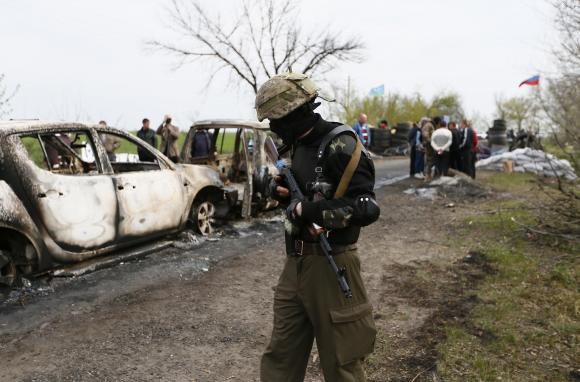
CREDIT: REUTERS/GLEB GARANICH
(Reuters) – At least three people were killed in a gunfight in the early hours of Sunday near a Ukrainian city controlled by pro-Russian separatists, shaking an already fragile international accord that was designed to avert a wider conflict.
The incident triggered a war of words between Moscow and Ukraine’s western-backed government with each questioning the other’s compliance with the agreement, brokered last week in Geneva, to end a crisis that has made Russia’s ties with the West more fraught than at any time since the Cold War.
The separatists said armed men from Ukraine’s Right Sector nationalist group had attacked them. The Right Sector denied any role, saying Russian special forces were behind the clash.
The deal signed in Geneva last week by the European Union, Russia, Ukraine and the United States agreed that illegal armed groups would go home.
So far, the pro-Russian militants have shown no signs of budging, though there was some hope of progress after Kiev said it would not move against the separatists over Easter, and international mediators headed to eastern Ukraine to try to persuade them to disarm.
But the shootings near Slaviansk – already a flashpoint for tensions between Ukraine’s rival camps – are likely to make that task even harder, hardening the view of pro-Russian sections of society that they cannot trust Kiev.
“The Easter truce has been violated,” the Russian foreign ministry said in a statement. “This provocation … testifies to the lack of will on the part of the Kiev authorities to rein in and disarm nationalists and extremists.”
The town’s self-appointed pro-Russia mayor placed a curfew on the town and appealed directly to Russia’s Vladimir Putin to consider sending in peace-keeping troops.
The Ukrainian foreign ministry hit back, reproaching Russia for hurrying to comment, without having the facts to hand to support its accusations.
“The Russian side must be reminded about their obligations under the Geneva agreement to bring all necessary influence to bear on separatists to clear illegally held buildings, unblock roads, lay down arms and prevent any bloodshed,” a statement said.
Right Sector spokesman Artem Skoropadsky said it was a “blasphemous provocation fromRussia: blasphemous because it took place on a holy night for Christians, on Easter night. This was clearly carried out by Russian special forces.”
Separatist militiamen near the eastern Ukrainian city of Slaviansk told Reuters four vehicles had approached their checkpoint at around 2:00 a.m. (2300 GMT) and opened fire.
“We had three dead, four wounded,” one of the separatist fighters, called Vladimir, told Reuters at the checkpoint, where there were two burned-out jeeps.
He said the separatists returned fire and killed two of the attackers, who he said were members of the nationalist movement which has its power base in the Ukrainian-speaking west of the country and is reviled by many in the Russian-speaking east.
Police in Kiev said three people had been killed and three wounded.
A Reuters cameraman at the scene said he saw the bodies of two people, one with what appeared to be gunshot wounds to the head and face, lying in the back of a truck.
One of the dead was dressed in camouflage fatigues, the other, identified by several bystanders as a local man, was in civilian clothes.
The deaths were the first in armed clashes in eastern Ukraine since the Geneva accord was signed on Thursday.
NO WILL TO MOVE
The crisis in Ukraine began late last year when President Viktor Yanukovich turned his back on closer ties with Europe, prompting protests in the capital. They led to him fleeing Kiev, and a pro-Western interim administration taking over.
Soon after, Moscow used its military to back separatists in Ukraine’s Crimea, before Putin signed a document annexing the peninsula. The United States and European Union responded by slapping sanctions on Russian officials.
The crisis has now shifted to the east of Ukraine, where armed groups of pro-Russian separatists have seized public buildings, saying they reject Kiev’s rule. Adding to the tension,Russia has deployed extra troops on the border with Ukraine.
Russia says it is not interfering in Ukraine, but that it has an obligation to protect the Russian-speaking community in the east from the rulers in Kiev, who it says are illegitimate, have ties to the far-right, and discriminate against ethnic Russians.
A senior mediator with the Organisation for Security and Cooperation in Europe (OSCE) set off for eastern Ukraine on Saturday to try to persuade pro-Russian groups to lay down their arms, in line with the Geneva accord.
After a meeting on Saturday in the Ukrainian capital, Swiss envoy Christian Schoenenberger, whose country is chair of the OSCE, said its monitors had spoken to several activists occupying public buildings.
“For the time being the political will is not there to move out,” he said.







